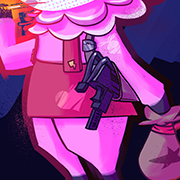|
devilmouse posted:Hey now - I mentioned this to you at least twice in emails. I wish you could have a nice sit down with our Creative Director! Edit: What specifically do you mean by harder. Do you mean make the grind longer, make it cost more etc, or do you mean actually make the game harder as in skill; or both? concerned mom fucked around with this message at 10:48 on Mar 13, 2013 |
|
|
|

|
| # ? Jun 5, 2024 23:48 |
|
RhysD posted:This is awesome! My new train ride game Yay, thanks! concerned mom posted:I wish you could have a nice sit down with our Creative Director! Surely your studio has business people who care about money, product managers who care about money, maybe a CFO who cares about money? Get THOSE people to have a sit down with your CD and smack him around a little bit. Failing that, you/he should feel free to email me if he wants a dose of tough love! As for the question? Mostly the former (though if you can pay around the later, that's okay too). It can't be difficult to understand or interact with and you don't want someone failing over and over because they're not twitchy enough, but if you look at something like the money-darling Candy Crush. Some of its later levels are impossible without a huge dose of luck in board setup / piece selection ... or by pulling out your wallet.
|
|
|
|
ApproachingInfinity posted:Also, please do post as much post-mortem type stuff as you like. A few coworkers/friends and I are thinking of attempting to start working on our own evening-indie sort of thing soon, targeting mobiles specifically, and even though we're not going in with any delusions of creating a huge smash financial success, we definitely want to make a real effort to have it succeed, and this kind of insight is very valuable; I'm sure I'm not alone in my appreciation of it. You're definitely not alone in appreciating it. I'm very ignorant of the realm of mobile gaming (despite having an iPhone for years - given the choice I'll pretty much always web-browse rather than game on that thing), and stuff like this helps me understand it a lot. And be a little creeped out by some of it honestly.
|
|
|
|
ApproachingInfinity posted:Also, please do post as much post-mortem type stuff as you like. A few coworkers/friends and I are thinking of attempting to start working on our own evening-indie sort of thing soon, targeting mobiles specifically, and even though we're not going in with any delusions of creating a huge smash financial success, we definitely want to make a real effort to have it succeed, and this kind of insight is very valuable; I'm sure I'm not alone in my appreciation of it. EDIT: do mind that I'd totally say try the indie thing on PC. I just made a mistake in targeting mobile. It was a better choice when I started than it would be now, basically. ... really though, it wasn't wasted time, and the press bump has set me up well for Hot Tin Roof. And the critical response I got still makes me smile. Just probably don't found a small studio focused on mobile financial success. Shalinor fucked around with this message at 15:31 on Mar 13, 2013 |
|
|
|
Shalinor posted:My immediate advice would be something along the lines of "oh god don't do it", as burbled up through a bottle of scotch, but I still need to wait and see how the numbers actually look a few months from now. I'll certainly post a link to the full post-mortem, once it's done. I'll pretty much agree with Shalinor. If you want to do it for funsies and learning, it's a great experience, but don't quit your day job before you've got your success in the bag.
|
|
|
|
devilmouse posted:One of the Greatest Lessons Learned at Zynga in order to make money was "Make It Harder". All through development, I would hand out printouts with a giant bold font that said simply that. Think something was about right? Make it harder. Think something was too hard? Make it harder. Just wanted to say that I love this post. MustardFacial posted:That's not why I got into games, nor is it why any of the rest of us got into games I'm willing to bet. Focus on your craft. Even if it doesn't pay the pills, find something soul-sucking that does. You'll always have this to give back with. When you have a business though, you need revenue, and if you want to use the capabilities that the business provides you to do the things you truly love, you need enough revenue that you can afford to do so. "A company's primary responsibility is to serve its customers, to provide the goods or services which the company exists to produce. Profit is not the primary goal but rather an essential condition for the company's continued existence. Other responsibilities, e.g., to employees and society, exist to support the company's continued ability to carry out its primary purpose." —Peter F. Drucker The road to creative freedom in business is hard, but nothing in life worth doing should be easy. If you're an indie developer and want easy, don't put a price tag on your games. Don't even put up a PayPal Donate button. Because as soon as you start thinking "I'd like to be rewarded for my work," you're in business and nobody who knows what they're doing gets into business because they expect easy. And if you are in business and find that what you're doing is easy, make it harder.
|
|
|
|
I just posted the perfect link in the wrong thread. This postmortem pretty much says, "make it harder." http://gamesauce.org/news/2013/02/07/indie-showcase-dynamic-pixels-goal-defense-ios-android/ It's kind of a shame, but it works. On the other hand, this lovely postmortem (I must read a few postmortems every day!) is simply amazing for missing the obvious through a cloud of business-speak. http://blog.digitalhinge.com/iphone-app-development-post-mortem-direct-action/
|
|
|
|
Shalinor posted:My immediate advice would be something along the lines of "oh god don't do it", as burbled up through a bottle of scotch, but I still need to wait and see how the numbers actually look a few months from now. I'll certainly post a link to the full post-mortem, once it's done. Hah, yeah the mobile market is looking meaner and meaner, and having the ability to also put it on desktops (or switch to it entirely) is definitely a thing we're considering. We'll be using Unity, so it won't even be that hard, other than creating a sensible interface for desktop versions vs mobile (or hey, maybe Windows 8 on touch PCs will have caught on by the time we're done  ). ).devilmouse posted:I'll pretty much agree with Shalinor. If you want to do it for funsies and learning, it's a great experience, but don't quit your day job before you've got your success in the bag. Yeah, definitely. None of us are even considering quitting our job to do this, it's purely a 'we've got the talent and (hopefully) a good idea, let's see if we can produce a finished, playable, maybe even fun game' thing. If it turns out to be profitable, all the better. Of course without that pressure, actually finishing it gets harder, but we're trying to keep it from being overambitious. j4on posted:I just posted the perfect link in the wrong thread. These are interesting. Well, the second one mostly funny, but still interesting. The first one is especially nice since they show the back and forth of the things they thought would work that didn't, and what specific things they did that actually did work. It's like the developers get their own game to play after they release
|
|
|
|
Adraeus posted:When you have a business though, you need revenue, A designer on a triple A game doesn't seem to (I can't say for sure, I've not worked triple-A) have to concern themselves with purchase incentives, ad placement, funneling, etc when designing Tomb Raider puzzles or when balancing weapons in an FPS, creating a narrative or making worlds, the emphasis goes on making the game fun and keeping the publisher happy. While I acknowledge monetisation methods are necessary for the model, that doesn't mean I like them, as a developer or a gamer. That's basically what my point boils down to. It's stuff I'm glad as an artist I don't have to concern myself with otherwise I'd be out of mobile games pretty quick. GeeCee fucked around with this message at 13:54 on Mar 14, 2013 |
|
|
|
I was trying to formulate a decent response to that post, but Aliginge did it much better than anything I was coming up with. For me it comes down to the fact that that kind of business and design model is a) not the type of game I like playing, b) not the type of game I enjoy working on (a physical toy-based game is bad enough at times), and c), not the only method to make games and make money, so my personal conclusion is to avoid that line of thinking, trends be damned.
|
|
|
|
While I was lead designing AAA I had to: look at the progress funnels from playtest sessions and use the data to optimise the tutorials, mission difficulty etc.; identify features that could be cut wholesale because they couldn't be completed to time & budget; then identify which of those features would be able to work as DLC and ensure nothing that was done in the main game "cock blocked" them from being able to exist later; identify where we could simply add extra content as retailer exclusive unlocks, that would inevitably later be bundled in to DLC packs; balancing in-game economy sinks and supplies so the player had a progression where they felt like they had to scrimp & save early on, but were wealthy later. That's just off the top of my head. If a f2p game is fun it makes everything else around monetising that game easier, because you're not trying to persuade people to spend on something they don't enjoy.
|
|
|
|
Adraeus posted:Just wanted to say that I love this post. Thanks for the advice from your vast experience in the Game Industry. Oh, wait, you have no idea what you're talking about. Your quotes and opinions don't give you one tiny bit of credibility yet you write as if people should listen to you. Please tell me more about what indie developers should or shouldn't do to monetize. (USER WAS PUT ON PROBATION FOR THIS POST)
|
|
|
|
Aliginge posted:A designer on a triple A game doesn't seem to (I can't say for sure, I've not worked triple-A) have to concern themselves with purchase incentives, ad placement, funneling, etc when designing Tomb Raider puzzles or when balancing weapons in an FPS, creating a narrative or making worlds, the emphasis goes on making the game fun and keeping the publisher happy. A designer that ignores their player behavior is a bad designer (or one that works in an Ivory Tower ... aka a bad designer). When I started in AAA in the 90s, we worried ourselves sick over our funnels, retention, and engagement because they made us money. We might not have called them that, but that's what they were. We didn't have fancy dashboards and javascript visualizations being pulled from massive clusters of data-crunching computers, but we put together what we could. We didn't have alarms that went off if revenue dropped by a certain amount, but we had a crappy beeper that would go off at 3am if a server went down or forum posts spiked. FPSs and RTSs going back to at least Q2 and Warcraft II actively looked at their metrics for balance and level design. Usability labs and user-testing was important and factored in to budgets and schedules. You know what made the publishers happy back then? Making money. You know what would cause them to give you more favorable terms on your next game? Making money on the previous game and showing them how you were going to make MORE money on the sequel. You know how you did that? Pretty graphs and charts explaining why a player comes back again and again even after they've finished the game. When I, as a designer, argue for or against a feature, I used to say, "Well, X did(n't) work in Y!" Now I say the same thing but I can add a "Because of..." and explain by just how much and what its effects were. Artists deal with the same reality, just in a slightly less measurable way, but we measure it all the same. Fun facts: Items with blue (especially water) and purple in them are more popular. In general, people shy away from characters that resemble bugs or have bug-like features. And on and on. If you're making a game for Nintendo, you only use comic violence because their player's moms buy fewer bloody titles. You get the drift. I realize there's a continuum along which there's the pure artists/designers who do everything by feeling on one side and on the other side are the cold-hearted, calculating BI guys, but eschewing either side completely is a terrible mistake. Edit: A good quote from working with Brian Reynolds: "Fun raises all of your metrics." devilmouse fucked around with this message at 14:43 on Mar 14, 2013 |
|
|
|
FreakyZoid posted:If a f2p game is fun it makes everything else around monetising that game easier, because you're not trying to persuade people to spend on something they don't enjoy. See, this really stood out to me. Games like The Old Republic are actually pretty good fun but they still manage to get some fairly weird F2P restrictions (the ability to sprint, for example, is locked to F2P players.) Where do you think some of these more oddball decisions come from? The developer, publisher or management? When porting a game from Pay to Play for Free to Play there must be some pretty weird hoops to jump through instead of designing for free to play from the ground up. Also: Dead Space 3's micro-transaction after paying full price - What's the general feeling on that? For me it feels a little bit like being double dipped as a customer. I've given you 39.99 for a copy of the game and now you want me to pay extra money for what is effectively a new difficulty mode? Sion fucked around with this message at 14:43 on Mar 14, 2013 |
|
|
|
Sion posted:See, this really stood out to me. Games like The Old Republic are actually pretty good fun but they still manage to get some fairly weird F2P restrictions (the ability to sprint, for example, is locked to F2P players.) Where do you think some of these more oddball decisions come from? The developer, publisher or management? From someone that doesn't understand F2P and is freaking out and slamming something, ANYTHING, in in the hopes of salvaging something.
|
|
|
|
Sion posted:See, this really stood out to me. Games like The Old Republic are actually pretty good fun but they still manage to get some fairly weird F2P restrictions (the ability to sprint, for example, is locked to F2P players.) Where do you think some of these more oddball decisions come from? The developer, publisher or management? When porting a game from Pay to Play for Free to Play there must be some pretty weird hoops to jump through instead of designing for free to play from the ground up. Watching some dev interviews, it seems like the actual restrictions came almost entirely from the dev team. They were saying how the idea of giving away the best parts of the game for free was almost blasphemy to the business people, but they got it through. SWTOR's F2P restrictions are always being updated for the better, which is a good thing. The only relevant restriction in the game (imo) is the reduced XP but the restrictions do slowly add up. That said, I saw a LOT of new subs, and honestly 15 bucks for a huge game is worth it for a lot of people. And you can definitely play through the entire storyline in a one month timeframe.
|
|
|
|
Sion posted:Also: Dead Space 3's micro-transaction after paying full price - What's the general feeling on that? For me it feels a little bit like being double dipped as a customer. I've given you 39.99 for a copy of the game and now you want me to pay extra money for what is effectively a new difficulty mode? I would love to see the metrics of how it all turned out though, but I suspect EA will never let on what %age of players converted. But then, I have a hard time paying £39.99 for a AAA game when I find myself getting a lot of entertainment out of 69p and f2p iOS games these days.
|
|
|
|
devilmouse posted:Edit: A good quote from working with Brian Reynolds: "Fun raises all of your metrics." ... and that's what I mean, about not wanting to ask myself "how much fun is enough." You don't have to ask that question outside of F2P, and AAA's "how much fun can I afford" is an entirely different question. EDIT: I see a lot of older folks in games mention getting more fun out of F2P / 99c, and I wonder how much that's skewing our view. I suspect we shift that way because we have less time, and portable gaming is better at fitting into that gap. Shalinor fucked around with this message at 16:43 on Mar 14, 2013 |
|
|
|
Shalinor posted:Really? So how'd that work out for Punch Quest? ... A crude argument as for why it didn't work for them with sketchy fake math! Metrics * Fun = $$$$ If the metrics are low, it won't matter how much fun something is. If, in the case of PQ, they weren't converting any spenders in the first place or spenders were spending very little, making something more fun won't help make any more money. It's not about making something fun enough, it's saying that if something is more fun, its metrics will be mor better. (Originally I was going to do this as a funny-looking proof, but SA doesn't support a [TeX] tag. GOSH!)
|
|
|
|
devilmouse posted:It's not about making something fun enough, it's saying that if something is more fun, its metrics will be mor better. ... which still means that, yes, you're intentionally making a game unfun for reasons of metrics. What you're proposing is a local maximization problem within the bounds of generally not very fun. How can we make this unfun game as fun as possible without removing the elements that make it unfun. EDIT: I'm not taking the moral high ground here, because I ultimately did the same thing with Jones when it was F2P. I was just saying, that's why I'm glad I don't have to focus on that anymore. "How much fun is enough fun." Shalinor fucked around with this message at 17:33 on Mar 14, 2013 |
|
|
|
devilmouse posted:A designer that ignores their player behavior is a bad designer (or one that works in an Ivory Tower ... aka a bad designer). When I started in AAA in the 90s, we worried ourselves sick over our funnels, retention, and engagement because they made us money. We might not have called them that, but that's what they were. We didn't have fancy dashboards and javascript visualizations being pulled from massive clusters of data-crunching computers, but we put together what we could. We didn't have alarms that went off if revenue dropped by a certain amount, but we had a crappy beeper that would go off at 3am if a server went down or forum posts spiked. FPSs and RTSs going back to at least Q2 and Warcraft II actively looked at their metrics for balance and level design. Usability labs and user-testing was important and factored in to budgets and schedules. There's a pretty huge difference between user research going into developing a traditional title and the sort of metrics involved in developing F2P/IAP stuff, and I think it's slightly disingenuous to suggest there's no difference in designing between the two. "We need to improve the tutorial because players can't understand feature X" is pretty different from "we need to nerf Y or move it behind a paywall because it's too effective for non-paying users and discourages IAP." It's definitely reductionist to suggest that they're the same because ultimately they're both doing better if the game is fun. e: There have been some pretty bad arguments on both sides of this, so really my point isn't that F2P design is bad and you should feel bad; it's just that it's silly to deny that it does add an extra dimension which is qualitatively different from the considerations made for games with a traditional point of sale, and that's a completely separate topic than the application of user research and data metrics to game design. Paniolo fucked around with this message at 17:36 on Mar 14, 2013 |
|
|
|
Some game design philosophy does seem to end up being less about creating something fun and rewarding, and more about creating a piece of software that exploits psychological quirks in order to make people want to keep playing/spending money. Once an industry starts that sort of evolutionary arms race, things start going downhill fast, and you end up with creations that are more a pathogen than an art, craft, or service. See also: advertising (that often seeks to literally insert false memories these days), mainstream news (creating an addictive emotional cycle which harms the consumer), etc. I don't say that to cast judgement in this thread (or the concept of F2P in general), and definitely not to criticize indie people trying to forge a living, it's just a really interesting topic to me, and I think it's a factor that will become more and more relevant in our lives as time goes on.
|
|
|
|
Congrats on the job Aliginge! I'll prolly see you in the pub at some point if you're out with the 4J guys.
|
|
|
|
Some pre-move research for you https://www.youtube.com/watch?v=9UprxM_aBWk
|
|
|
|
The way I see it, f2p is pretty similar to arcade stuff. Want the player to have fun but spend more money, and making it tough is a good way to do that, and if someone wats to do well with low effort, there's endless room for quarters to get you the extra lives etc. As far as I'm concerned this stuff has always been in game development.
|
|
|
|
So much I could respond to while I was at lunch, but alas for lack of time... Paniolo posted:There's a pretty huge difference between user research going into developing a traditional title and the sort of metrics involved in developing F2P/IAP stuff, and I think it's slightly disingenuous to suggest there's no difference in designing between the two. I said as much in my post above. It's a continuum. It's a challenge to balance all of the factors in game-making and no one part can be ignored by ANYONE (designers can't be ignorant of metrics, PMs can't ignore design-considerations, artists need to be aware of tech constraints, and so on). With my current team, my counterparts are all player-advocates while I wave the flag of "So we've gotta make money here, guys..." And we both respect and understand our various positions and all want to work towards something that we 1) enjoy, 2) our players enjoy, and 3) keeps the lights on. When subscription games started, they were criticized in the same way ("you're just using cheap tricks to keep the playerbase paying!", "you don't care about us, you just care about our subscription", etc). Similarly, arcade games in the 70s and 80s were vilified in similar ways.
|
|
|
|
Paniolo posted:There's a pretty huge difference between user research going into developing a traditional title and the sort of metrics involved in developing F2P/IAP stuff, and I think it's slightly disingenuous to suggest there's no difference in designing between the two. "We need to improve the tutorial because players can't understand feature X" is pretty different from "we need to nerf Y or move it behind a paywall because it's too effective for non-paying users and discourages IAP." It's definitely reductionist to suggest that they're the same because ultimately they're both doing better if the game is fun. Both your original comment and edit both make sense. The one thing I'd point out though is that it seems (to me anyway) that your comments about the difference between AAA and F2P/IAP research are off as a function of being too granular. While things like usability studies/labs do vary wildly in the data they collect and how they collect it from a F2P/IAP dashboard, the underlying research principles are still there: identify the KPIs relevant to your business and obsess about them from a customer standpoint. As for whether or not F2P is inherently bad for the industry. I think it is too soon to tell, additionally, one thing I haven't seen anyone talk about in this thread is why they think F2P/IAP has so quickly become a business model.
|
|
|
|
Shalinor posted:Then your proof evaluates to "more fun is always better, so long as the game still conforms to the generally unfun confines of a F2P game with good metrics." I guess this is the point I take issue with when I ask "unfun for who?". Is it unfun because you expect to sit down and play it for half an hour or longer like a normal game, and we slow your progress? Is it fun if I just play for 30-60s on the train in that same game model? I really, honestly think that labeling F2P games inherently "unfun" is flawed if you're not providing any context. I think a huge majority of successful F2P games are very much "fun" within the context of the experience provided. Most of them allow you to continue having fun past the roadblocks if you're willing to engage heavily or monetize. I don't think that seems earth shattering, but it does require a perspective shift to see it. Edit: Juc66 posted:The way I see it, f2p is pretty similar to arcade stuff. And what does the typical experience look like for an arcade game? Hint: It's not traditional, sit-down gaming, long session play times. theysayheygreg fucked around with this message at 18:23 on Mar 14, 2013 |
|
|
|
Iron Leg posted:And what does the typical experience look like for an arcade game? Hint: It's not traditional, sit-down gaming, long session play times. From that angle, I can see your point. Within the context of an arcade game, the "NINE... EIGHT... SEVEN <intense music>..." screen begging me to add more quarters is, honestly, part of the experience. That's the entire reason I used it in Jones, I loved it as an arcade callback. Sure, I wouldn't want to see that in a single-player game I'm playing on my TV at home, but that doesn't make the arcade game less fun. It just makes it an arcade game. I think the reason this comes up is because the playerbase of mobile isn't as clear-cut as arcades. On mobile, there is a large contingent of players sitting there, waiting for the actual games. When an Avernum pops out, a Saturday Morning RPG, they all drop everything and grab it - and I'm one of those players. I mostly avoid F2P. Then you have the players that use their devices on the train, bus, whatever, and are just looking for popcorn entertainment. The latter group is way bigger than the former group, and the latter group is the group for which all current App Store visibility systems are geared, hence, the latter group is the group you must target shy of big marketing spend. So when you're talking about "who is it fun for," that's the split. F2P mechanics aren't fun for Premium group, but I suppose they are for the F2P group. The Premium group may put up with the F2P mechanics if the game is really good, but that's where the friction comes into play, and they get a sense that you're bleeding them for money. (and since I'm in the Premium group in terms of my gaming habits, that's the direction I approach this from, even if I'm the relative niche market) EDIT: Iron Leg posted:That said, I very strongly believe is that there's a market for F2P games for core gamers. There's already a lot of signs of this in the top grossing as it is, and I can guess that many companies are betting on that being the next big wave. ... and since none of that is really an option for smaller players like myself, I mostly ignore it. And since small and mid-sized players are continuing to make single-player games, it kind of shoots the people claiming that model is dead in the foot. I don't see good things in the future for the industry as a result. I believe the big players will try and effectively kill off single-player games with the next generation, replacing them with F2P or reduced cost + IAP, and in the process, they're going to both lose their core demographic to indies and mid-sized players in the PC downloadable market, and lose the F2P casual market as the novelty wears off. I think this runs some significant risk of being what crashes AAA, but we shall see. Shalinor fucked around with this message at 19:18 on Mar 14, 2013 |
|
|
|
Shalinor posted:So when you're talking about "who is it fun for," that's the split. F2P mechanics aren't fun for Premium group, but I suppose they are for the F2P group. The Premium group may put up with the F2P mechanics if the game is really good, but that's where the friction comes into play, and they get a sense that you're bleeding them for money. (and since I'm in the Premium group in terms of my gaming habits, that's the direction I approach this from, even if I'm the relative niche market) That's exactly correct. It's hard as a designer (trust me, it's hard) to divorce yourself from one group and build for the other. I'm still learning the intricacies of it, and only with a lot of help from consumer insights and a truckload of opposition research. Don't feel too bad about it. That said, I very strongly believe is that there's a market for F2P games for core gamers. There's already a lot of signs of this in the top grossing as it is, and I can guess that many companies are betting on that being the next big wave.
|
|
|
|
AmazonTony posted:Both your original comment and edit both make sense. The one thing I'd point out though is that it seems (to me anyway) that your comments about the difference between AAA and F2P/IAP research are off as a function of being too granular. While things like usability studies/labs do vary wildly in the data they collect and how they collect it from a F2P/IAP dashboard, the underlying research principles are still there: identify the KPIs relevant to your business and obsess about them from a customer standpoint. Well I explicitly didn't mention AAA because I don't really think its a question of AAA vs mobile; I agree with devilmouse that it's a continuum and many AAA games find themselves making the same kinds of considerations regarding DLC, online passes and micro transactions. The arcade comparison is apt but its arguable game design made huge leaps forward once it moved out of the arcade into the home.
|
|
|
|
Casinos make money because they study use human psychology to draw in gamblers and keep them playing their games using the same kinds of metrics that are used for arcade games and mobile games and any game for that matter (or really, most measurable things in general). So I ask myself: what really is the difference between an arcade game and a casino game? Then, what's the difference between those games and the game I want to make? What I'm saying in a very roundabout way is: there are certain fine lines where gaming turns into gambling and certain lines where the allure of gaming becomes destructive, and I think we owe it to ourselves to consider whether we contribute anything with our games other than a dopamine fix. D1Sergo fucked around with this message at 19:16 on Mar 14, 2013 |
|
|
|
D1Sergo posted:Casinos make money because they study use human psychology to draw in gamblers and keep them playing their games using the same kinds of metrics that are used for arcade games and mobile games and any game for that matter (or really, most measurable things in general). Uh, quite a lot. That's a gross generalization. With exception to the actual gambling games in the iOS store, I don't think you can make strong comparison between casinos and most of the F2P games. There are some here and there that use randomisation to boost spend, but it's not the norm, and even then we're not talking about the same patterns or designs as a slot machine or a game of poker. quote:Then, what's the difference between those games and the game I want to make? There's a huge difference between gambling and F2P gaming. There's not a fine line where one suddenly becomes the other. Do timers and calls-to-action constitue a dopamine fix? Potentially. Am I a swindling designer and a casino manager for implementing them? Seems like a stretch.
|
|
|
|
I didn't say that F2P is gambling, I'm saying that there are situations that warrant consideration above "how much money can we get people to spend?" Some F2P titles like to place people into losing situations to force them to spend money to keep playing, much like arcade games and gambling. I don't agree with using metrics to find the place where the user is most likely to want to continue spending money and forcing them into a losing situation at that point so that they will spend that money. There are many great F2P and monetization models, I don't agree with any that uses the player's success or failure as a monetized event.
|
|
|
|
Paniolo posted:Well I explicitly didn't mention AAA because I don't really think its a question of AAA vs mobile; I agree with devilmouse that it's a continuum and many AAA games find themselves making the same kinds of considerations regarding DLC, online passes and micro transactions. Oh...I just mis-understood what you were saying. I totally agree with what you're saying above.
|
|
|
|
I always find it weird that people talk about the psychological tricks of f2p as if games haven't been using this stuff for decades already. "Gotta catch 'em all" - oh Nintendo you evil villains playing mind games on children.
|
|
|
|
FreakyZoid posted:I always find it weird that people talk about the psychological tricks of f2p as if games haven't been using this stuff for decades already. "Gotta catch 'em all" - oh Nintendo you evil villains playing mind games on children. "Click here to pay 300 PokeBux to progress to the next gym!" "Looks like your battle isn't going very well, have you thought about buying a Max Revive for 50 PokeBux?" D1Sergo fucked around with this message at 20:39 on Mar 14, 2013 |
|
|
D1Sergo posted:"Click here to pay 300 PokeBux to progress to the next gym!" "Your Pokemon are tired and need to rest for 8 hours. Or you can buy a Recuperation Potion for 100 pokebux and play more right now!"
|
|
|
|
|
Someone should make an iOS arcade game where you have to pay a 25-cent IAP to launch the app and every time you die, you have to pay a 10-cent IAP to continue. Edit: Oh god, that was a joke, but I bet you'd make money if that kind of thing was allowed... mutata fucked around with this message at 21:19 on Mar 14, 2013 |
|
|
|

|
| # ? Jun 5, 2024 23:48 |
|
I had an idea a couple of years ago called Millionaire Leaderboard where you pay 69p to get your name with a link in it to the top. If you pay more it stays up for longer. You could have some publicity stunts like someone proposing with a link to a picture of a ring or Coca Cola paying to get their website to the top or something. If anyone uses this idea please send me some free coke or propose to me thanks.
|
|
|























